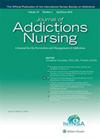Jordanian University Students' Lived Experience of Misusing Amphetamine (Captagon)
IF 0.6
4区 医学
Q4 NURSING
引用次数: 0
Abstract
Abstract Background Substance misuse is a growing problem among Jordanian university students. Purpose The aim of this study was to explore the lived experiences of university students who misuse Captagon (amphetamines). Methods The interpretative phenomenological analysis methodology was used. In-depth face-to-face interviews were conducted with 10 Jordanian university students, aged 17–22 years, who were using Captagon (amphetamines) for the last 6 months. Results Three major themes detailed participants' experiences with Captagon: (a) causes for use, (b) effects of taking amphetamines, and (c) seeking help behaviors and support. Participants who experienced academic and personal stress sought help from friends, who provided them with Captagon pills as a way to overcome their life challenges. Initially, taking Captagon provided participants with a sense of control, but it did not solve their problems. Later or as the days passed by, they experienced increased level of stress, felt disorganized in a way that they missed classes, and were being socially isolated. Participants finally sought community help for their problem, but this was difficult because of stigmatizing attitudes in their community toward substance misuse. Conclusions Increasing university students' knowledge about the negative consequences of substance misuse and raising awareness of strategies to address the problem will help young people to make more informed choices, because today's young generation are tomorrow's citizens.约旦大学生滥用安非他明的生活经历(Captagon)
摘要背景药物滥用是约旦大学生中日益严重的问题。目的探讨滥用安非他明的大学生的生活经历。方法采用解释性现象学分析方法。对10名年龄在17-22岁的约旦大学生进行了深入的面对面访谈,他们在过去6个月内使用了Captagon(安非他明)。三个主要主题详细描述了参与者使用Captagon的经历:(a)使用原因,(b)服用安非他明的效果,以及(c)寻求帮助行为和支持。经历学业和个人压力的参与者向朋友寻求帮助,朋友给他们提供了Captagon药片,作为克服生活挑战的一种方式。最初,服用Captagon给参与者提供了一种控制感,但并没有解决他们的问题。后来或随着时间的流逝,他们经历了越来越大的压力,感觉自己在某种程度上没有组织,以至于他们错过了课程,并且在社会上被孤立。参与者最终为他们的问题寻求社区帮助,但这是困难的,因为他们的社区对药物滥用的污名化态度。增加大学生对药物滥用的负面影响的认识,提高对解决问题的策略的认识,将有助于年轻人做出更明智的选择,因为今天的年轻一代是明天的公民。
本文章由计算机程序翻译,如有差异,请以英文原文为准。
求助全文
约1分钟内获得全文
求助全文
来源期刊
CiteScore
1.20
自引率
6.70%
发文量
68
审稿时长
>12 weeks
期刊介绍:
Journal of Addictions Nursing (JAN) – JAN is the official journal of IntNSA and is a peer-reviewed quarterly international journal publishing original articles on current research issues, practices and innovations as they related to the field of addictions. Submissions are solicited from professional nurses and other health-care professionals engaged in treatment, prevention, education, research and consultation.
Each issue of the Journal of Addictions Nursing contains original full-length papers as well as several regular features sections:
· Perspectives features points of view and commentaries on relevant issues
· Media Watch provides summaries and critiques of print and digital resources.
· Innovative Roles examines unique roles that nurses in addictions are implementing
· Research Reviews offers summaries and critiques of research studies in the field

 求助内容:
求助内容: 应助结果提醒方式:
应助结果提醒方式:


